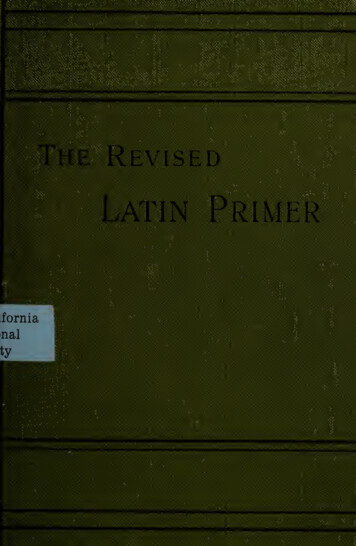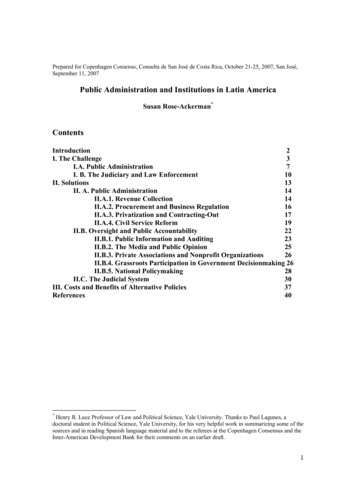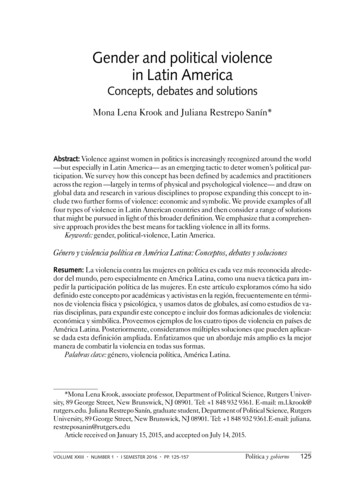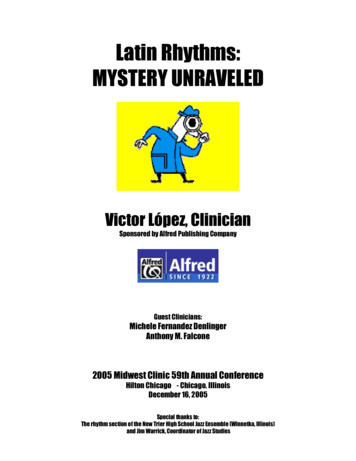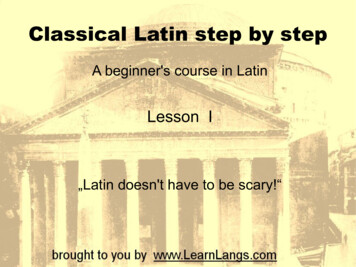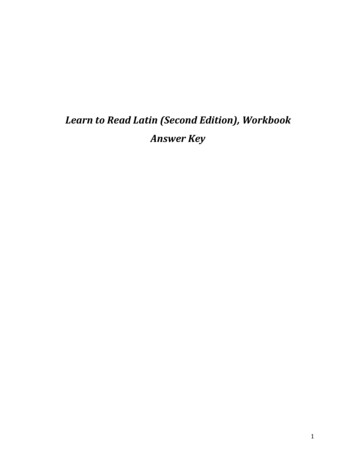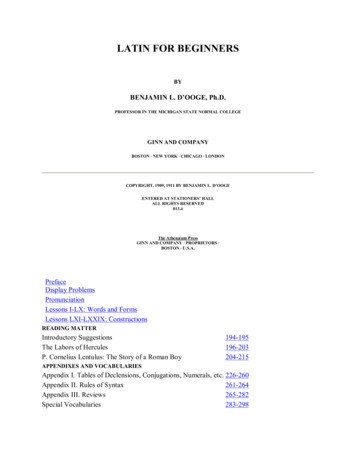
Transcription
LATIN FOR BEGINNERSBYBENJAMIN L. D’OOGE, Ph.D.PROFESSOR IN THE MICHIGAN STATE NORMAL COLLEGEGINN AND COMPANYBOSTON NEW YORK CHICAGO LONDONCOPYRIGHT, 1909, 1911 BY BENJAMIN L. D’OOGEENTERED AT STATIONERS’ HALLALL RIGHTS RESERVED013.4The Athenæum PressGINN AND COMPANY PROPRIETORS BOSTON U.S.A.PrefaceDisplay ProblemsPronunciationLessons I LX: Words and FormsLessons LXI LXXIX: ConstructionsREADING MATTERIntroductory SuggestionsThe Labors of HerculesP. Cornelius Lentulus: The Story of a Roman Boy194 195196 203204 215APPENDIXES AND VOCABULARIESAppendix I. Tables of Declensions, Conjugations, Numerals, etc. 226 260Appendix II. Rules of Syntax261 264Appendix III. Reviews265 282Special Vocabularies283 298
Latin English VocabularyEnglish Latin VocabularyINDEX194299 331332 343344 348READING MATTERINTRODUCTORY SUGGESTIONSHow to Translate. You have already had considerable practice in translating simple Latin, andhave learned that the guide to the meaning lies in the endings of the words. If these are neglected,no skill can make sense of the Latin. If they are carefully noted and accurately translated, notmany difficulties remain. Observe the following suggestions:1. Read the Latin sentence through to the end, noting endings of nouns, adjectives, verbs, etc.2. Read it again and see if any of the words you know are nominatives or accusatives. This willoften give you what may be called the backbone of the sentence; that is, subject, verb, and object.3. Look up the words you do not know, and determine their use in the sentence from theirendings.4. If you cannot yet translate the sentence, put down the English meanings of all the words in thesame order as the Latin words. You will then generally see through the meaning of the sentence.5. Be careful toa. Translate adjectives with the nouns to which they belong.b. Translate together prepositions and the nouns which they govern.c. Translate adverbs with the words that they modify.d. Make sense. If you do not make sense, you have made a mistake. One mistake will spoil awhole sentence.6. When the sentence is correctly translated, read the Latin over again, and try to understand it asLatin, without thinking of the English translation.195 The Parts of a Sentence. You will now meet somewhat longer sentences than you have hadbefore. To assist in translating them, remember, first of all, that every sentence conveys ameaning and either tells us something, asks a question, or gives a command. Every sentencemust have a subject and a verb, and the verb may always have an adverb, and, if transitive, willhave a direct object.
However long a sentence is, you will usually be able to recognize its subject, verb, and object orpredicate complement without any difficulty. These will give you the leading thought, and theymust never be lost sight of while making out the rest of the sentence. The chief difficulty intranslating arises from the fact that instead of a single adjective, adverb, or noun, we often have aphrase or a clause taking the place of one of these; for Latin, like English, has adjective,adverbial, and substantive clauses and phrases. For example, in the sentence The idle boy doesnot study, the word idle is an adjective. In The boy wasting his time does not study, the wordswasting his time form an adjective phrase modifying boy. In the sentence The boy who wastes histime does not study, the words who wastes his time form an adjective clause modifying boy, andthe sentence is complex. These sentences would show the same structure in Latin.In translating, it is important to keep the parts of a phrase and the parts of a clause together andnot let them become confused with the principal sentence. To distinguish between thesubordinate clauses and the principal sentence is of the first importance, and is not difficult ifyou remember that a clause regularly contains a word that marks it as a clause and that this wordusually stands first. These words join clauses to the words they depend on, and are calledsubordinate conjunctions. They are not very numerous, and you will soon learn to recognizethem. In Latin they are the equivalents for such words as when, while, since, because, if, before,after, though, in order that, that, etc. Form the habit of memorizing the Latin subordinateconjunctions as you meet them, and of noting carefully the mood of the verb in the clauses whichthey introduce.196HERCULES197THE LABORS OF HERCULES
Hercules, a Greek hero celebrated for his great strength, was pursued throughout his life by thehatred of Juno. While yet an infant he strangled some serpents sent by the goddess to destroy him.During his boyhood and youth he performed various marvelous feats of strength, and onreaching manhood he succeeded in delivering the Thebans from the oppression of the Minyæ. Ina fit of madness, sent upon him by Juno, he slew his own children; and, on consulting theDelphic oracle as to how he should cleanse himself from this crime, he was ordered to submithimself for twelve years to Eurystheus, king of Tiryns, and to perform whatever tasks wereappointed him. Hercules obeyed the oracle, and during the twelve years of his servitudeaccomplished twelve extraordinary feats known as the Labors of Hercules. His death was caused,unintentionally, by his wife Deiani ra. Hercules had shot with his poisoned arrows a centaurnamed Nessus, who had insulted Deianira. Nessus, before he died, gave some of his blood toDeianira, and told her it would act as a charm to secure her husband’s love. Some time after,Deianira, wishing to try the charm, soaked one of her husband’s garments in the blood, notknowing that it was poisoned. Hercules put on the robe, and, after suffering terrible torments,died, or was carried off by his father Jupiter.LIII.1 THE INFANT HERCULES AND THE SERPENTSHERCULES ET SERPENTESDī2 grave supplicium sūmmit de malīs, sed iī quī lēgibus3 deōrum pārent, etiam post mortemcūrantur. Illa vīta dīs2 erat grātissima quae hominibus miserīs ūtilissima fuerat. Omnium autempraemiōrum summum erat immortālitās. Illud praemium Herculī datum est.Herculis pater fuit Iuppiter, māter Alcmēna, et omnium hominum validissimus fuisse dīcitur. SedIūnō, rēgīna deōrum, eum, adhūc 198 īnfantem, interficere studēbat; nam eī4 et5 Herculēs etAlcmēna erant invīsī. Itaque mīsit duās serpentīs, utramque saevissimam, quae mediā noctedomum6 Alcmēnae vēnērunt. Ibi Herculēs, cum frātre suō, nōn in lectulō sed in scūtō ingentīdormiēbat. Iam audācēs serpentēs adpropinquāverant, iam scūtum movēbant. Tum frāter, terrōrecommōtus, magnā vōce mātrem vocāvit, sed Herculēs ipse, fortior quam frāter, statim ingentīsserpentīs manibus suīs rapuit et interfēcit.1. This number refers to the lesson after which the selection may be read.
2. Dī and dīs are from deus. Cf. § 468.3. lēgibus, § 501. 14.4. eī, to her, referring to Juno.5. et . et, both . and.6. domum, § 501. 20.LIV. HERCULES CONQUERS THE MINYÆHerculēs ā puerō1 corpus suum gravissimīs et difficillimīs labōribus exercēbat et hōc modōvīrēs2 suās cōnfirmāvit. Iam adulēscēns Thēbīs3 habitābat. Ibi Creōn quīdam erat rēx. Minyae,gēns validissima, erant fīnitimī Thēbānīs, et, quia ōlim Thēbānōs vīcerant, quotannīs lēgātōsmittēbant et vectīgal postulābant. Herculēs autem cōnstituit cīvīs suōs hōc vectīgālī līberāre etdixit rēgī, “Dā mihi exercitum tuum et ego hōs superbōs hostīs superābō.” Hanc condiciōnem rēxnōn recūsāvit, et Herculēs nūntiōs in omnīs partis dīmīsit et cōpiās coēgit.4 Tum temporeopportūnissimō proelium cum Minyīs commīsit. Diū pugnātum est, sed dēnique illī impetumThēbānōrum sustinēre nōn potuērunt et terga vertērunt fugamque cēpērunt.1. ā puerō, from boyhood.2. virēs, from vīs. Cf. § 468.3. Thēbīs, § 501. 36. 1.4. coēgit, from cōgō.HE COMMITS A CRIME AND GOES TO THE DELPHIAN ORACLE TO SEEK EXPIATIONPost hoc proelium Creōn rēx, tantā victōriā laetus, fīliam suam Herculī in mātrimōnium dedit.Thēbīs Herculēs cum uxōre suā diū vīvēbat et ab omnibus magnopere amābātur; sed post multōsannōs subitō 1in furōrem incidit et ipse suā manū līberōs suōs interfēcit. Post breve tempus 2adsānitātem reductus tantum scelus expiāre cupiēbat et cōnstituit ad ōrāculum Delphicum iterfacere. Hoc autem ōrāculum erat omnium clārissimum. Ibi sedēbat fēmina quaedam quae Pȳthiaappellābātur. Ea cōnsilium dabat iīs quī ad ōrāculum veniēbant.1. in furōrem incidit, went mad.2. ad sānitātem reductus, lit. led back to sanity. What in good English?
199HERCULES LEONEM SUPERATLV. HERCULES BECOMES SUBJECT TO EURYSTHEUS1 HE STRANGLES THE NEME AN LIONItaque Herculēs Pȳthiae tōtam rem dēmonstrāvit nec scelus suum abdidit. Ubi iam Herculēsfīnem fēcit, Pȳthia iussit eum ad urbem Tīryntha2 discēdere et ibi rēgī Eurystheō sēsēcommittere. Quae3 ubi audīvit, Herculēs ad illam urbem statim contendit et Eurystheō sē inservitūtem trādidit et dīxit, “Quid prīmum, Ō rēx, mē facere iubēs?” Eurystheus, quīperterrēbātur vī et corpore ingentī Herculis et eum occidī4 studēbat, ita respondit: “Audī,Herculēs! Multa mira5 nārrantur dē leōne saevissimō quī hōc tempore in valle Nemaeā omniavāstat. Iubeō tē, virōrum omnium fortissimum, illō mōnstrō hominēs līberāre.” Haec verbaHerculī maximē placuērunt. “Properābo,” inquit, 200 “et parēbō imperiō6 tuō.” Tum in silvās inquibus leō habitābat statim iter fēcit. Mox feram vīdit et plūrīs impetūs fēcit; frūstrā tamen, quodneque sagittīs neque ūllō aliō tēlō mōnstrum vulnerāre potuit. Dēnique Herculēs saevum leōnemsuīs ingentibus bracchiīs rapuit et faucīs eius omnibus vīribus compressit. Hōc modō brevītempore eum interfēcit. Tum corpus leōnis ad oppidum in umerīs reportāvit et pellem posteāprō7 veste gerēbat. Omnēs autem quō eam regiōnem incolēbant, ubi fāmam dē morte leōnisingentis accēpērunt, erant laetissimī et Herculem laudābant verbīs amplissimīs.1. Eu rys theus (pronounced U ris thūs) was king of Tī ryns, a Grecian city, whose foundationgoes back to prehistoric times.2. Tīryntha, the acc. case of Tīryns, a Greek noun.3. Quae, obj. of audīvit. It is placed first to make a close connection with the preceding sentence.This is called a connecting relative.4. occīdī, pres. pass. infin.5. mīra, marvelous things, the adj. being used as a noun. Cf. omnia, in the next line.6. imperiō, § 501. 14.7. prō, for, instead of.LVI. SLAYING THE LERNE AN HYDRA
Deinde Herculēs ab Eurystheō iussus est Hydram occīdere. Itaque cum amīcō Iolāō1 contenditad palūdem Lernaeam ubi Hydra incolēbat. Hoc autem mōnstrum erat serpēns ingēns quaenovem capita habēbat. Mox is mōnstrum repperit et summō2 cum perīculō collum eius sinistrāmanū rapuit et tenuit. Tum dextrā manū capita novem abscīdere incēpit, sed frūstrā labōrābat,quod quotiēns hoc fēcerat totiēns alia nova capita vidēbat. Quod3 ubi vīdit, statuit capita ignīcremāre. Hōc modō octō capita dēlēvit, sed extrēmum caput vulnerārī nōn potuit, quod eratimmortāle. Itaque illud sub ingentī saxō Herculēs posuit et ita victōriam reportāvit.1. Iolāō, abl. of I o lā us, the hero’s best friend.2. Note the emphatic position of this adjective.3. Quod ubi, when he saw this, another instance of the connecting relative. Cf. p. 199, l. 3.LVII. THE ARCADIAN STAG AND THE ERYMANTHIAN BOARPostquam Eurystheō mors Hydrae nuntiata est, summus terror animum eius occupavit. Itaqueiussit Herculem capere et ad sē reportāre cervum quendam; nam minimē cupīvit tantum virum inrēgnō suō tenēre. Hie autem cervus dīcēbātur aurea cornua et pedēs multō1 celeriōrēs ventō2habēre. Prīmum Herculēs vestīgia animālis petīvit, deinde, ubi cervum ipsum vīdit, omnibusvīribus currere incēpit. Per plūrimōs diēs contendit nec noctū cessāvit. Dēnique postquam per201 tōtum annum cucurrerat—ita dīcitur—cervum iam dēfessum cēpit et ad Eurystheum portāvit.Tum vērō iussus est Herculēs aprum quendam capere quī illō tempore agrōs Erymanthiōsvāstābat et hominēs illīus locī magnopere perterrēbat. Herculēs laetē negōtium suscēpit et inArcadiam celeriter sē recēpit. Ibi mox aprum repperit. Ille autem; simul atque Herculem vīdit,statim quam3 celerrimē fūgit et metū perterritus in fossam altam sēsē abdidit. Herculēs tamensummā cum difficultāte eum extrāxit, nec aper ūllō modō sēsē līberāre potuit, et vīvus adEurystheum portātus est.1. multō, § 501. 27.2. ventō, § 501. 34.3. quam. What is the force of quam with a superlative?LVIII. HERCULES CLEANS THE AUGE AN STABLES AND KILLS THE STYMPHALIAN BIRDSDeinde Eurystheus Herculī hunc labōrem multō graviōrem imperāvit. Augēās1 quīdam, quī illōtempore rēgnum Ēlidis2 obtinēbat, tria mīlia boum3 habēbat. Hī4 ingentī stabulō continēbantur.Hoc stabulum, quod per trīgintā annōs nōn pūrgātum erat, Herculēs intrā spatium ūnīus diēīpūrgāre iussus est. llle negōtium alacriter suscēpit, et prīmum labōre gravissimō maximamfossam fōdit per quam flūminis aquam dē montibus ad mūrum stabulī dūxit. Tum partem parvammūrī dēlēvit et aquam in stabulum immīsit. Hōc modō fīnm operis fēcit ūnō diē facillimē.Post paucōs diēs Herculēs ad oppidum Stymphālum iter fēcit; nam Eurystheus iusserat eum avisStymphālidēs occīdere. Hae avēs rōstra ferrea habēbant et hominēs miserōs dēvorābant. Ille,postquam ad locum pervēnit, lacum vīdit in quō avēs incolēbant. Nūllō tamen modō Herculēsavibus adpropinquāre potuit; lacus enim nōn ex aquā sed ē līmō cōnstitit.5 Dēnique autem avēs6dē aliquā causā perterritae in aurās volāvērunt et magna pars eārum sagittīs Herculis occīsa est.
1. Augēās, pronounced in English Aw jē as.2. Ēlidis, gen. case of Ēlis, a district of Greece.3. boum, gen. plur. of bōs. For construction see § 501. 11.4. ingentī stabulō, abl. of means, but in our idiom we should say in a huge stable.5. cōnstitit, from consto.6. dē aliquā causā perterritae, frightened for some reason.202HERCULES ET TAURUSLIX. HERCULES CAPTURES THE CRETAN BULL AND CARRIES HIM LIVING TO EURYSTHEUSTum Eurystheus iussit Herculem portāre vīvum ex īnsulā Crētā taurum quendam saevissimum.Ille igitur nāvem cōnscendit—nam ventus erat idōneus—atque statim solvit. Postquam trīduumnāvigavit, incolum
Latin English Vocabulary 299 331 . They are not very numerous, and you will soon learn to recognize them. In Latin they are the equivalents for such words as when, while, since, because, if, before, after, though, in order that, that , etc. Form the habit of memorizing the Latin subordinate .
